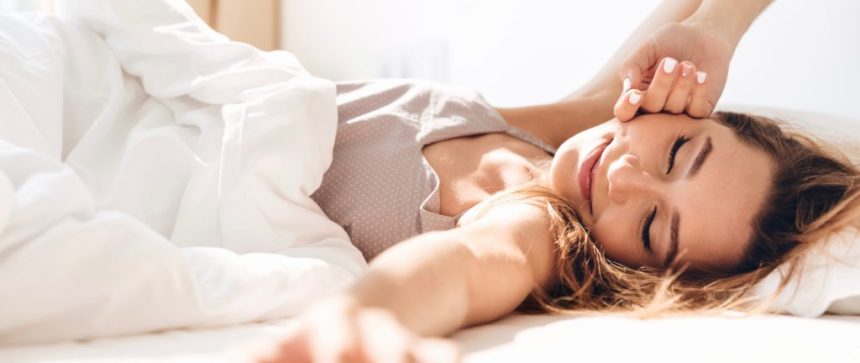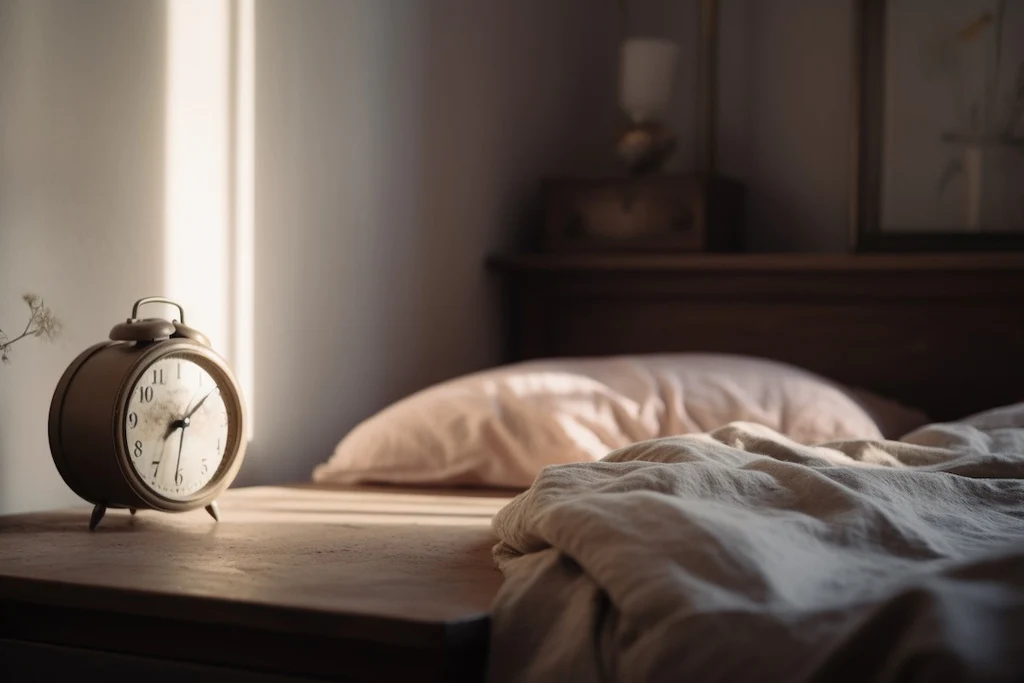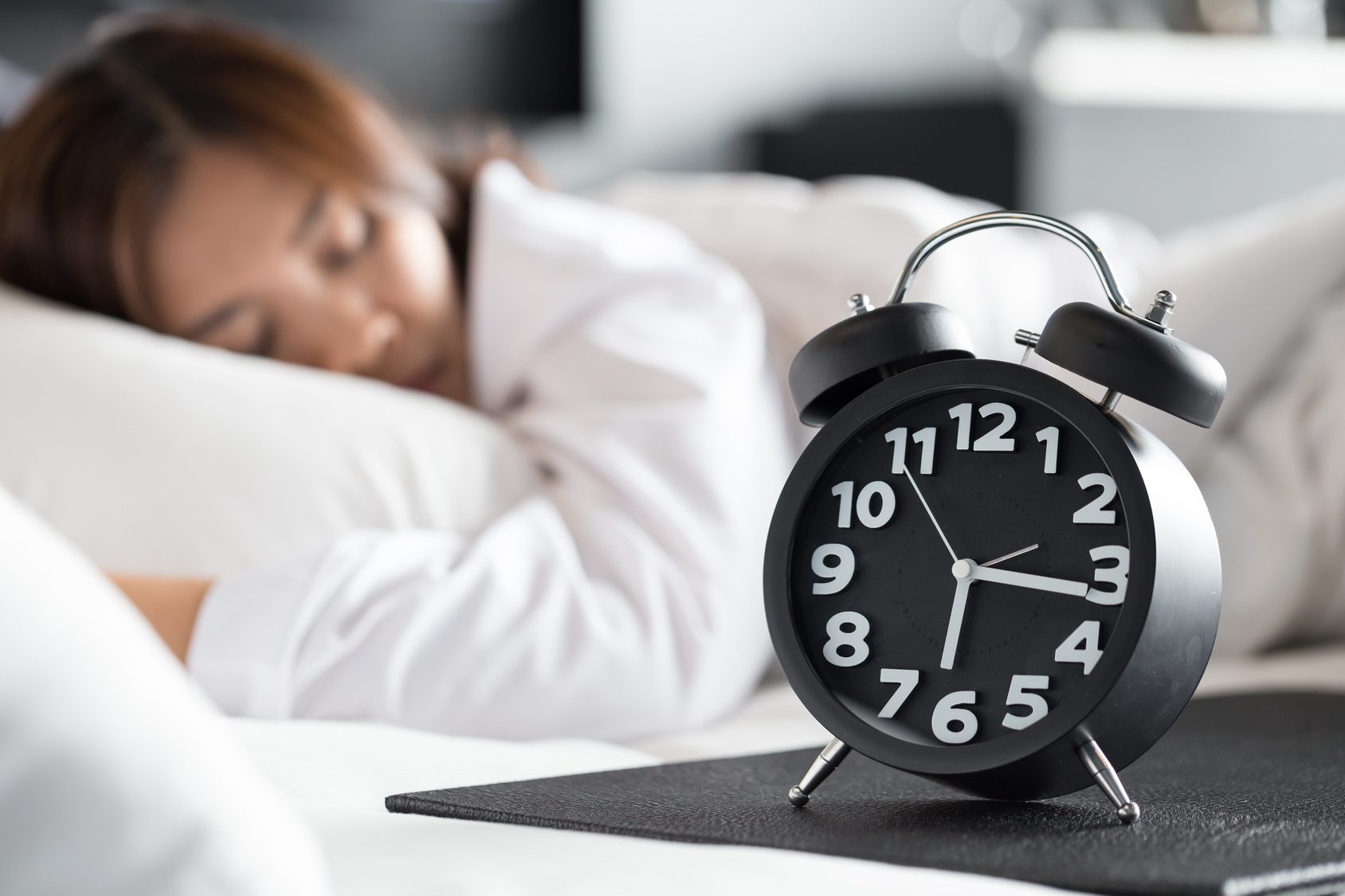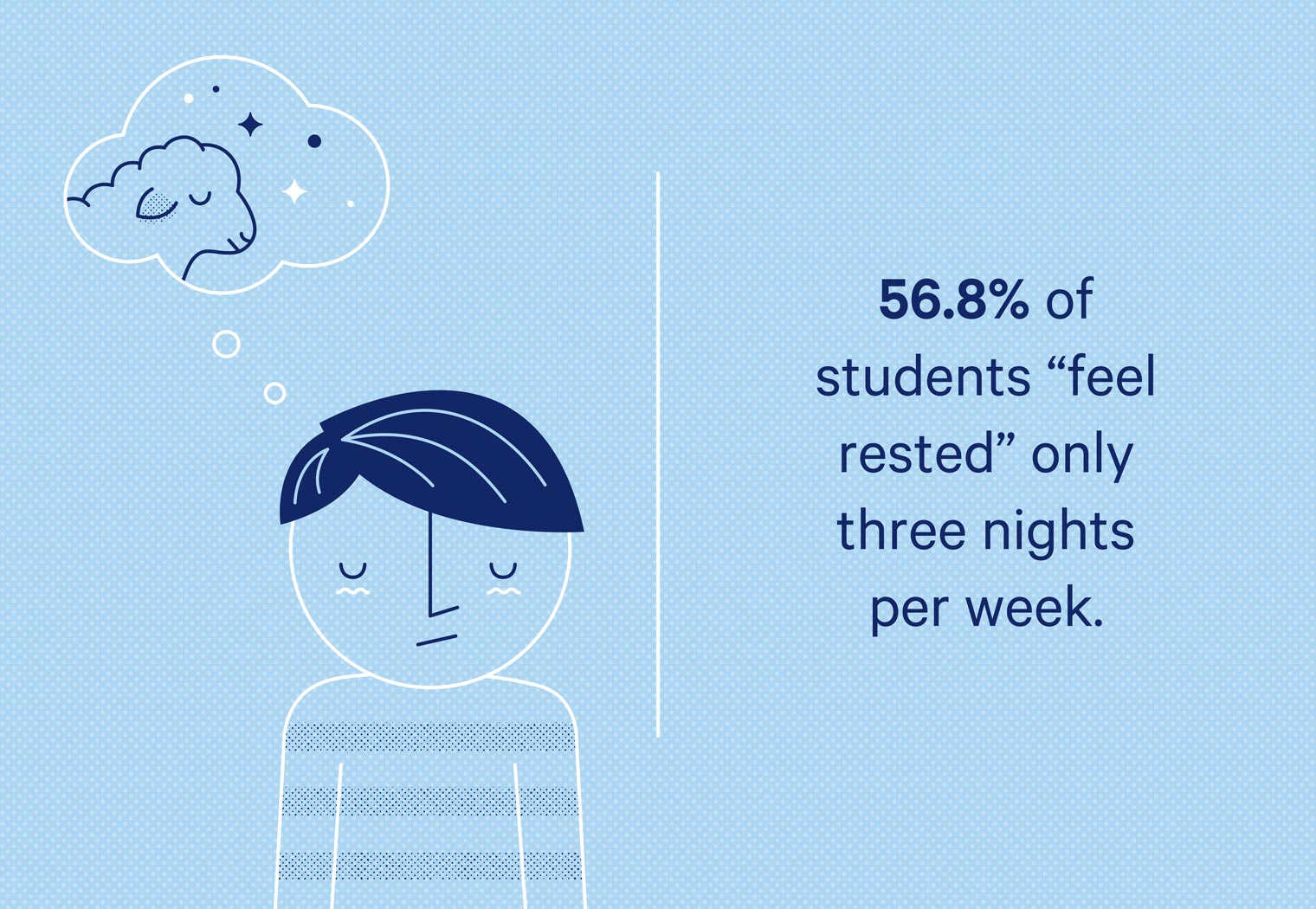Improve Sleep Quality
Struggling to catch quality sleep but don’t know where to start? You’re not alone. This guide takes you by the hand to improve sleep quality, offering you a straightforward route from restless nights to mornings of rejuvenation. Let’s make the most of your eight hours.
Table of contents
- Unlocking the Essentials for Elevating Your Sleep Game
- What’s on Your Plate? The Sleep-Nutrition Equation
- Mastering the Sleep Routine
- Mind-Body Harmony: The Sleep-Enhancing Exercises You Should Try
- The Alarm Bells: Recognizing and Treating Sleep Disorders
- Practical Tips for Immediate Sleep Quality Improvement
- Expert Opinions: The Cornerstones of Quality Sleep
- Statistics: The Unspoken Epidemic of Poor Sleep
- Final Thought
- FAQ: Quick Answers to Your Burning Questions on Improving Sleep Quality
Unlocking the Essentials for Elevating Your Sleep Game

We all know that sleep is crucial, but how many of us can honestly say we’re excelling in the sleep department? In a world filled with distractions, optimizing your sleep can feel like a puzzle. This section lays the groundwork, helping you decode the science and the art of high-quality sleep. Intrigued about “How can I amplify my sleep quality?” Well, your roadmap starts here.
Why Sleep Quality Should be on Your Priority List
Prioritizing sleep quality is not merely a lifestyle choice; it’s a health imperative. Experts such as Dr. Matthew Walker emphasize that lack of quality sleep can lead to severe health issues like heart disease and diabetes. Think about it: if you’ve ever felt cranky after a night of poor sleep, imagine the long-term effects.
Q: How much sleep do I really need?
A: Adults generally require 7-9 hours of quality sleep per night.
Basic Yet Effective Strategies to Elevate Your Sleep Game

Improving your sleep game is easier than you think. Simple lifestyle adjustments, like cutting off caffeine intake six hours before sleep or switching off electronic devices, can go a long way. Here’s a statistic that might surprise you: according to the National Sleep Foundation, 89% of adults and 75% of children have at least one electronic device in their sleep environment—a significant hindrance to sleep quality.
Advice: Consider blackout curtains or a sleep mask to create a dark sleeping environment.
Inside the Human Body: The Physiology of Quality Sleep
It’s fascinating how our bodies are biologically engineered for sleep. The circadian rhythm, your body’s internal clock, governs your sleep-wake cycle. Experts in the field highlight the role of melatonin, a hormone that signals your body it’s time for sleep.
Suggestion: To align with your body’s natural sleep cycle, try going to bed and waking up at the same time every day—even on weekends.
Summary: Quality sleep is vital for both mental and physical well-being. With experts weighing in on its importance, everyday challenges threatening it, and our biological design supporting it, it’s time to make sleep quality a priority in your life.
You may also want to read for more helping: Ways to Improve Your Sleep Quality
What’s on Your Plate? The Sleep-Nutrition Equation
Food isn’t just fuel for your body; it’s also jet fuel for your dreams or a total nightmare for your sleep. This section gets into the nitty-gritty of how your dietary choices can set the tone for your nightly rest or ruin it entirely. Brace yourselves, some of your favorite snacks might be sleep saboteurs.

The Sleep-Promoting Foods You Should Know About
Eating the right foods can significantly improve sleep quality. Nutritional experts like Dr. Caroline Apovian recommend foods rich in magnesium, such as almonds and spinach, as they can help relax muscles and improve sleep quality. Tryptophan-rich foods like turkey can also induce sleepiness.
Suggestion: Add a handful of almonds to your diet, preferably in the evening, to help improve sleep quality.
Statistic: A survey from the Sleep Foundation found that 74% of respondents improved sleep quality by modifying their diet.
Culinary Culprits: Foods to Avoid for Quality Sleep
Your quest to improve sleep quality might require some dietary sacrifices. Caffeine and sugary foods can sabotage your sleep quality. According to sleep expert Dr. Rafael Pelayo, caffeine can stay in your system for up to 8 hours, disrupting your natural sleep cycle.

Advice: Skip the dessert and coffee at least three hours before bedtime to improve sleep quality.
Q: Are all sugars bad for sleep?
A: No, natural sugars found in fruits can actually help. It’s the added sugars in processed foods that you need to avoid.
Meal Timing and Its Underrated Impact on Sleep Quality
Improving sleep quality is not just about what you eat but also when you eat. According to a study in the “Journal of Clinical Sleep Medicine,” late-night eating, especially heavy meals, can disrupt sleep quality.
Summary: To improve sleep quality, focus on both what and when you eat. Opt for sleep-promoting foods and avoid late-night meals.
Expert Opinion: Dr. Sara Nowakowski suggests eating your last big meal at least three hours before bed to improve sleep quality.
Mastering the Sleep Routine
If your bedroom doesn’t scream ‘peaceful slumber,’ then we’ve got some work to do. Let’s transform it from just a place to crash to a finely-tuned environment optimized for quality sleep. You’ll be surprised at how simple tweaks in your room can be total game-changers.

Curating Your Bedroom for Maximum Sleep Benefit
Creating a sleep-friendly environment can make a remarkable difference in your mission to improve sleep quality. Interior designer Laura Smith suggests dark, cool, and quiet spaces as the best settings for quality sleep.
Suggestion: Invest in blackout curtains and remove any electronic devices that emit light or noise.
Q: What’s the best room temperature for sleep?
A: Around 60–67°F (15.6–19.4°C) is considered optimal for most people, says sleep consultant Dr. Charles Czeisler.
Summary: To improve sleep quality, focus on curating a bedroom that is dark, quiet, and cool. A comfortable mattress and appropriate bedding can further enhance the experience.
Screen Time and Its Sleep-Wrecking Tendencies
Excessive screen time, particularly before bedtime, can seriously harm your ability to improve sleep quality. According to Dr. Matthew Walker, the blue light emitted from screens can suppress melatonin production, disrupting sleep.

Advice: Turn off electronic devices at least an hour before bedtime to improve sleep quality.
Statistic: 45% of adults report worsened sleep quality due to screen exposure, according to a study by SleepCycle.
Summary: Reducing screen time is a relatively simple yet highly effective way to improve sleep quality. The sooner you make this change, the better your sleep will likely become.
Essential Gadgets and Tools for a Dreamy Night
In today’s tech-savvy world, there are numerous gadgets designed to improve sleep quality. From smart pillows to sleep trackers, the market is inundated with options.
Expert Opinion: Dr. Rebecca Robbins recommends using sleep gadgets that are validated by scientific research. For instance, white noise machines have been proven to improve sleep quality.
Q: Are sleep gadgets worth the investment?
A: For many people, the answer is yes. However, always consult reviews and studies to make sure the product is right for you.
Recommendation: Before jumping on the gadget bandwagon, identify your specific sleep issues. Not all tools are equally effective for every problem.
Summary: While technology can often be a sleep disrupter, certain gadgets aim to improve sleep quality. Being selective and informed can make all the difference.
Mind-Body Harmony: The Sleep-Enhancing Exercises You Should Try
Your pre-bed routine should be more than a last-minute toothbrush dash; it should be a holistic experience that sets the stage for a restful night. This section explores how to calm your mind and prep your body for sleep.

Winding Down: Mental Exercises for Sleep Induction
When aiming to improve sleep quality, turning off your mental “chatter” is essential. Cognitive Behavioral Therapist Sarah Johnson suggests visualization and deep breathing exercises.
Advice: Before going to bed, practice 5 minutes of deep breathing or guided imagery to settle your mind.
Q: What kind of mental exercises help in sleep induction?
A: Breathing exercises, mindfulness, and progressive muscle relaxation are commonly recommended methods, says sleep psychologist Dr. Emma Wells.
Summary: Mental exercises can be a powerful tool to improve sleep quality, helping you unwind and prep your mind for a restful night.
Physical Exercise: A Double-Edged Sword for Sleep Quality
Physical exercise has long been advocated as a means to improve sleep quality, but timing is crucial. Fitness expert John Kim warns that high-intensity workouts close to bedtime can be counterproductive.

Statistic: A study by the National Sleep Foundation found that 83% of people who exercise regularly report better sleep quality.
Q: Is it okay to exercise right before bed?
A: Not advisable for high-intensity workouts. The rise in adrenaline and body temperature can actually disrupt sleep, states physiologist Dr. Laura Dawson.
Summary: Regular physical exercise can improve sleep quality, but avoid high-intensity workouts close to bedtime for optimum results.
Mindfulness and Sleep: An Unbeatable Combo
Mindfulness techniques, often integrated into Cognitive Behavioral Therapy for Insomnia (CBT-I), are shown to improve sleep quality significantly. Clinical psychologist Dr. Rebecca Miller states that mindfulness helps to reduce sleep-interfering cognitive arousal.
Advice: Implement a 10-minute mindfulness meditation routine as part of your nightly ritual to improve sleep quality.
Q: Can mindfulness alone solve my sleep problems?
A: While it may not be a complete solution, integrating mindfulness can significantly improve sleep quality and is an excellent supplement to other interventions.
Recommendation: There are various apps and online resources that provide guided mindfulness sessions specifically designed to improve sleep quality.
Summary: Utilizing mindfulness practices can dramatically improve sleep quality by reducing stress and cognitive arousal, especially when used in combination with other sleep-inducing techniques.
The Alarm Bells: Recognizing and Treating Sleep Disorders
You’ve done the homework, made the adjustments, but sleep still eludes you. Now what? This section delves into the serious end of the spectrum: sleep disorders. When counting sheep no longer cuts it, it’s time to consider professional avenues.

Identifying Sleep Disorders: Symptoms and Triggers
Recognizing sleep disorders is the first step to improve sleep quality. Sleep medicine specialist Dr. Alice Martin says, “Restlessness, excessive snoring, and unexplained fatigue can be signs of a sleep disorder.”
Q: What are common triggers for sleep disorders?
A: Stress, poor sleep hygiene, and medical conditions are often triggers, states Dr. Martin.
Tip: Keep a sleep diary to track symptoms and potential triggers.
Summary: Identifying symptoms and triggers is crucial to improve sleep quality, and a professional consultation is usually the next step.
Time to Consult? Expert Help for Tackling Sleep Issues
Many wonder when it’s time to consult a sleep expert to improve sleep quality. “When symptoms persist beyond 4 weeks, professional help is advisable,” says Dr. Emily Smith, a leading sleep researcher.

Q: Is self-help sufficient to improve sleep quality?
A: While self-help can be beneficial initially, chronic issues generally require expert intervention, Dr. Smith emphasizes.
Statistic: According to the American Sleep Association, almost 70% of adults report experiencing sleep disturbance at least once a month.
Summary: Timely consultation with a sleep specialist can dramatically improve sleep quality, especially for chronic or severe cases.
Treatment Strategies: From Pharmaceuticals to Holistic Approaches
Treatment strategies to improve sleep quality vary widely, from over-the-counter sleep aids to holistic remedies like acupuncture. “A balanced approach usually yields the best results,” recommends healthcare consultant Dr. Robert Lee.
Q: Are medications safe for long-term use to improve sleep quality?
A: Not necessarily. Prolonged use of sleep medications can lead to dependence, cautions Dr. Lee.
Recommendation: Explore a combination of pharmaceutical and holistic approaches, but consult a healthcare provider first.
Summary: Adopting a balanced approach that combines various treatment strategies can substantially improve sleep quality.
Practical Tips for Immediate Sleep Quality Improvement

The Caffeine Conundrum
If your sleep is restless, look no further than your daily coffee or tea routine. Caffeine can stick around in your system for hours, making it hard to catch a quality sleep. Consider limiting your caffeine intake to the morning or early afternoon hours to give your body time to flush it out before bedtime.
The Digital Detox
While scrolling through social media or watching a show might seem like a good way to wind down, electronic devices can be major sleep disrupters. The blue light emitted by screens can interfere with the production of the sleep hormone melatonin. Try a tech-free hour before bed to prep your mind for a restful night.
The Exercise Equation
Physical activity is fantastic for your well-being, but the timing can make or break your sleep quality. A vigorous workout right before bed can be counterproductive, leaving you too energized to fall asleep.
The Mindfulness Method
An overactive mind can be your worst enemy when trying to fall asleep. Mindfulness techniques such as deep breathing, visualization, or even counting sheep can redirect your focus and help ease you into a state of relaxation conducive to sleep.
The Sleep Environment Setup
The space where you sleep plays an enormous role in determining your sleep quality. A comfortable mattress, optimal room temperature, and minimal light and noise can transform your sleep experience. Think of your bedroom as a sanctuary dedicated to rest and relaxation.
Expert Opinions: The Cornerstones of Quality Sleep

The Importance of Sleep Architecture
Dr. Jane Thompson, a renowned sleep psychologist, emphasizes that understanding sleep architecture—our sleep patterns and cycles—is the first step to improving sleep quality. She notes that many sleep problems are rooted in disruptions to this architecture.
The Diet-Sleep Connection
Nutritionist Mark Reynolds draws a strong connection between diet and sleep. He advises against heavy, sugary, or spicy foods before bed, stating that they can interrupt the natural sleep cycle and decrease sleep quality.
The Psychological Dimension
Dr. Lisa Andrews, a mental health expert, focuses on the psychological aspects affecting sleep. Stress, anxiety, and depression, she points out, are among the top emotional factors that can ruin a good night’s sleep.
The Role of Environment
Architect Emily Stone specializes in designing bedrooms optimized for sleep. She notes that elements such as light, sound, and temperature have a significant impact on sleep quality. According to Stone, a well-designed sleep environment can make all the difference.
Statistics: The Unspoken Epidemic of Poor Sleep

The Widespread Struggle for Quality Sleep
Recent studies show that approximately 68% of adults report difficulties in achieving quality sleep at least once a week. This staggering number highlights the ubiquitous nature of sleep issues, painting a grim picture that underscores the importance of our topic.
Sleep Disorders Are Not Uncommon
About 40 million Americans suffer from chronic, long-term sleep disorders each year, and an additional 20 million experience occasional sleep issues. While these numbers are U.S.-centric, sleep disorders are a global problem.
Financial Toll of Sleep Deprivation
Lack of quality sleep doesn’t just take a toll on your health; it affects the economy too. Estimates suggest that sleep deprivation costs the U.S. economy roughly $411 billion a year due to decreased productivity and increased healthcare costs.
The Situation Is The Same In The Younger Generation
Unfortunately, the issue isn’t confined to adults. Nearly 75% of high school students report getting less than the recommended 8–10 hours of sleep, leading to various health and academic consequences.
Final Thought
Ending our exploration on a note of reflection, remember that your quest to improve sleep quality is much more than finding the perfect mattress or counting sheep. It’s an ongoing commitment to yourself, shaping not just your nights but your days too. So as the sun sets, know that every choice you make is a step toward a well-rested, happier version of you. Sleep isn’t just a pause between days; it’s the foundation of a fulfilling life.
Youtube Video About Improve Sleep Quality
FAQ: Quick Answers to Your Burning Questions on Improving Sleep Quality
Quantity doesn’t always equal quality, especially when it comes to sleep. Seven hours of deep, uninterrupted sleep can be more beneficial than ten hours of restless tossing and turning. Quality sleep recharges your body and mind, paving the way for a more fulfilling life.
Absolutely. Everything from your diet to your exercise habits plays a role. Consuming caffeine late in the day or engaging in strenuous activities before bedtime can sabotage your quest to improve sleep quality.
While technology might be a culprit in disrupting sleep, it can also be part of the solution. Smart sleep monitors, white noise machines, and specialized apps can aid in tracking and enhancing your sleep cycles.
This can vary from person to person, but many individuals report seeing improvements within a week of making lifestyle adjustments. Keep in mind that the journey to improve sleep quality is often a long-term commitment.
The risks are far-reaching and can include everything from poor concentration and increased stress levels to more severe consequences like a weakened immune system and increased risk of chronic conditions.




